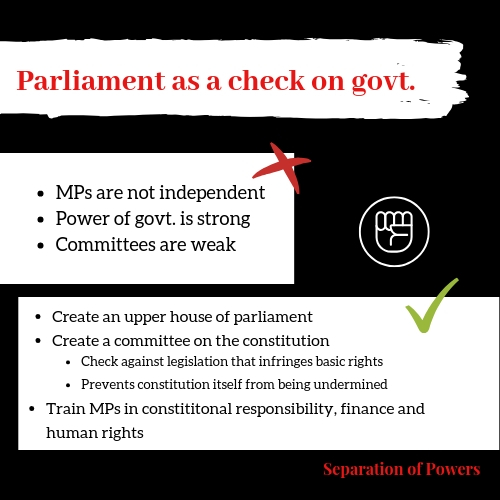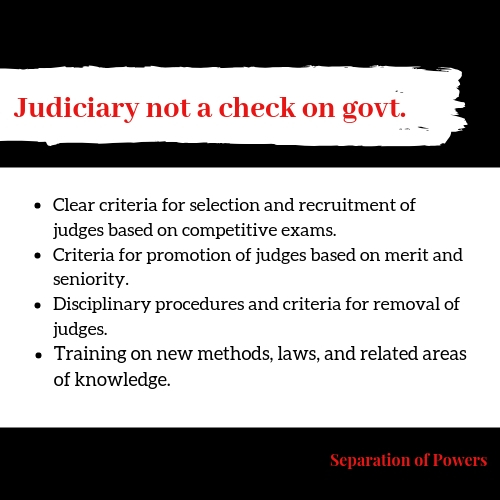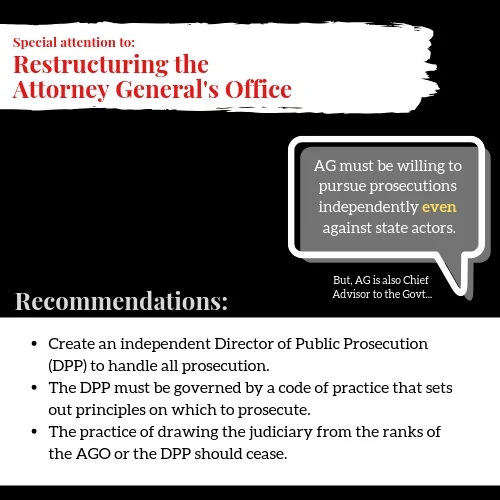By Rohan Samarajiva
The events of the past few months (and indeed the past few years) in Sri Lanka have puzzled me. The President and his coterie are flagrantly violating the Constitution and laws. That is shocking, but what is more shocking is the casual acceptance of this behavior by all concerned. What is surprising is not that the President violates the law and disregards explicit directions from lawful authority, but that the citizenry seem to accept it. Not that the President tries to impress university teachers by inviting them to dinner at Temple Trees, but that most of them go, and some even kiss the hands of their host.
After much reflection, I have had to conclude that we are witnessing a head-on collision between Constitutionalism and Feudalism. Constitutionalism is respect for words on paper that say what power holders can and cannot do; it is basically about the widespread respect for law:
Constitutionalism as a theory and in practice stands for the principle that there are—in a properly governed state—limitations upon those who exercise the powers of government, and that these limitations are spelled out in a body of higher law which is enforceable in a variety of ways, political and judicial. This is by no means a modern idea, for the concept of a higher law which spells out the basic norms of a political society is as old as Western civilization. That there are standards of rightness which transcend and control public officials, even current popular majorities, represents a critically significant element of man's endless quest for the good life. (Fellman,1973-74: 491-92).
This basic idea of constraints on power may not really be Western, as evidenced by the story of the cow seeking and receiving justice from King Elara 2000 years ago. But perhaps, that story was told because it was so exceptional. In any case, the story is from the Anuradhapura era, the highest manifestation of Sinhala-Tamil civilization in this country (King Elara was Tamil). Our proximate connection is to the Mahanuwara era, the lowest form of Sinhala-Tamil civilization in this island, where the kings exercised absolute power, constrained not by abstract notions of justice, but only by the concurrence of the Sangha and the fealty of the Kandyan feudal lords (the British conquered Kandy when Sri Vikrama Rajasinha/Kannasamy and his feudal lords fell out).
One may differ from Fellman’s claim that Constitutionalism is a “Western” or Judeo-Christian construct. The Hammurabi Code, the oldest known body of law, is often used as an illustration of fundamental laws that even the king cannot change, and the acceptance of which constitutes Constitutionalism. This is not the place for an extensive historical digression, but one may hypothesize that complex urban civilizations with extensive divisions of labor require Constitutionalism, while the more primitive forms based on subsistence agriculture or hunting and gathering do not. This hypothesis suggests that the Anuradhapura and Polonnaruwa civilizations included forms of adherence to Constitutionalism, while the lower forms of the Kandyan period did not.
We were introduced to Constitutionalism by the colonial powers, especially the British. Through experiences such as the Bracegirdle incident of 1937, where the colonial Supreme Court overruled the colonial Governor, the local elites came to appreciate the practice of Constitutionalism and lived by its tenets for several decades after Independence. Election promises could be, and were, broken, but laws were respected and obeyed.
When the 1945 Soulbury Constitution, especially the entrenched Article 29(2) ("the Parliament of Ceylon shall not make any law rendering persons of any community or religion liable to disabilities or restrictions to which persons of other communities are not made liable, ...") and the provisions ensuring an independent civil service, proved too constraining, the politicians of the day did not simply disregard it as they do now; they carried out a Constitutional Revolution and got themselves a new, less-constraining fundamental law. Despite the revolution carried out by an unlikely coalition of Kandyan feudals (Mrs Bandaranaike was a direct descendant of a signatory of the Kandyan Convention) and assorted Marxists (some with first-hand memories of the Bracegirdle victory), the basic idea of Constitutionalism was still alive. Otherwise why did they go to all that trouble?
The 1972 Constitution was an abomination: it stripped the safeguards for minorities and broke the back of the administrative service; its adoption without the participation of the Tamil parties created the conditions for civil war. It was replaced by the 1978 Constitution fully within the amendatory provisions of its predecessor. Even the removal of Supreme Court judges was done within the letter, if not the spirit, of the law. JR Jayewardene kept fiddling with the 1978 Constitution, amending it over and over again and ruining its integrity. He was autocratic, but within the bounds of Constitutionalism; just like his friend Lee Kuan Yew of Singapore, who used the law to subjugate his opponents.
It took the next generation of Kandyan feudals to start eating away at Constitutionalism. The attack began with the appointment of a controversial Chief Justice under instructions to mangle the 1978 Constitution by interpreting it to permit cross-overs of MPs. Still the façade of Constitutionalism was preserved; just that an unprincipled Chief Justice was interpreting it in ways that served short-term interests of the then President. But by corrupting the highest court, that descendent of the Ratwatte Disave, commenced the insidious final assault on the last bulwark of Constitutionalism and prepared the ground for the restoration of feudalism as the political framework of Sri Lanka.
The cruder violations of the principle of Constitutionalism came with the 17th Amendment, ironically intended to be the ultimate constraint on the abuse of Presidential power. Now the façade of Constitutionalism was torn off. The President (not the current one) simply ignored the parts she did not like, a practice continued by her successor but in cruder form. The Supreme Court, then in the thrall of a lawless Chief Justice, proved no constraint. There is not enough evidence to assess the nature of the current Supreme Court, but given the grievous assaults the institution has suffered and the servility of the legal profession and the Bar Association, there is little cause for optimism. But, of course, there is always hope. Remember Pakistan.
So it appears that the political elite’s dalliance with Constitutionalism has about run its course, sixty years after Independence. We are reverting to our native Feudalism: not just the ruling family but large swaths of the populace, including opinion leaders and intellectuals. For example, Ven Maduluwave Sobitha Thero, an erudite and eloquent senior monk, was quoted some time back in the Lankadeepa, saying that the legislature was superfluous; all we needed was a President who would be elected periodically and a judicial system. In the past, our kings used to appoint whoever they wished as Ministers, so should our Presidents. There is no need to go through the complications of electing Ministers or having them be accountable to Parliament. Not pure feudalism, where the king can do anything, but close enough. And no suggestion that the Presidency can pass from father to son, though of course there is no prohibition against the son running for office (the only one available in this truly home-grown form of government).
It appears that Constitutionalism of the classic kind has been found wanting. At the end of five decades of Independence, we were still poor, still beholden to external powers, and still incapable of regaining sovereign control of the national territory. We had to shut down the city even to celebrate the fiftieth anniversary of Independence. This was not seen as a result of bad economic policy (which it was), but of Constitutionalism. When leaders with feudal mindsets gained power, there were no institutional brakes to stall their multifarious assaults on Constitutionalism, as there were in India, when Indira Gandhi tried it. The Left coalitions broke the back of the administrative machinery in the 1960s and completed the job with the 1972 Constitution, and the judiciary was corrupted in the 1990s. The assault on the media that began in the 1960s reached its apogee in 2009. The private sector could not get out of its “deal” mentality and professionals, with a few honorable exceptions, lacked spine.
Now, Sri Lanka is reverting to its Kandyan state: an all powerful king and royal family; assorted feudal lords who serve at the pleasure of the king, but have limited power of their own. In the old days, the regional feudals gave the king revenue and troops, in exchange for the right to extract rents from the peasants. Today, the regional feudals deliver votes to the king at the periodic elections, in return for the right to extract rents from the private sector. As in the old days, the Sangha are consulted and placated by the king with Benz cars and assorted gifts (a practice not started by the present President) and serve as a weak check on his power.
This is the larger context that explains the kissing of the President’s hands by university academics; the conversion of artistes to vandibhattayas; and the blurring of the lines between the king, the government and the state. When the President uses state resources to win elections or prints his visage on currency notes, he does not see that he is doing anything wrong, because he is no longer functioning within the “western” frame of Constitutionalism. When the President appoints his kith and kin and court favorites to positions of power and nominates them to run for political office, such actions are accepted by the more deserving party workers on the ground because they too interpret events from within the feudal frame. When I question the handing over of scarce broadcasting frequencies to political favorites without any form of transparent process, journalists question my motives, because I am the one outside the dominant feudal frame that allows the king to reward courtiers. Sri Lanka is no longer a country governed by law, but is a kingdom, with a thin veneer of Constitutionalism for external consumption. Dissonance exists only for a few like me, still unable to shed the western baggage of the Magna Carta and Montesquieu.
The real question is, therefore, not about which individual wins the Presidential Election, but about whether we can (or should) get back to Constitutionalism. All successful presidential candidates since 1994 have promised to abolish the executive presidency; all have broken their promises. Constitutionalism is not words on paper, but broad acceptance across society that certain kinds of words on paper have binding authority and must be respected. It is what will give meaning to the word of a candidate. Even if the executive presidency is abolished or the Constitution is amended, nothing has any meaning unless Constitutionalism is restored. What use are words on paper, when none respect them?
The larger question is the governing framework. Do university teachers rush to kiss the ring and vice chancellors prostrate themselves before Presidents in modern societies? Can we have a modern economy when the largest companies in the country obey patently illegal directions from regulators? Is it normal to name a government-owned, money-losing airline for the head of state and paint the tail of the leased aircraft with his campaign livery? These are symptoms of a transition from a Constitutional State to a feudal one.
It may be argued that today’s complex, globally-connected national economy cannot be effectively managed by a bunch of Presidential cronies and that the procedures of representative democracy and checks and balances are essential, and that therefore, there is no alternative to Constitutionalism. It may also be argued that every country has a Constitution and that over time, as the economy develops and matures, as was the case in South Korea and Taiwan, Constitutionalism also takes root. But if these were true, why is it that Sri Lanka is sliding back into feudalism, just as it is becoming a middle-income country? Myanmar is governed feudally, but can a feudal system handle a complex economy like Sri Lanka’s?
As a colleague who read the first draft stated:
“A society embracing feudalism in whatever guise can no longer expect, at the same time, certain other cherished ideals including, but not limited to:
meritocracy: the best performing persons assured to get best public/academic appointments
fairness: everyone treated as equals, irrespective of wealth or family connections
due process: transparent, consultative policy making and policy implementation in the public interest
equality before the law, affording protection to everyone irrespective of social status or political affiliation
Feudalism, on the other hand, is inherently and fundamentally incompatible with all the above and other values. In fact, there can be no public interest whatsoever in a feudal society; only vested interests. Mervin Silvas, Sakvithis, Potta Naufers and their ill will be the norm, not exception. There won't be a chance in hell for any bright, hard working, honest young man or woman with no family or political connections to rise in society professionally, intellectually, artistically or entrepreneurially -- unless they sell their soul to the ruling oligarchy/family.”
Are there autochthonous (why do I use this word? Because the sonorous radio broadcasts of the Minister of Constitutional Affairs in the 1970 government, Dr Colvin R. de Silva, imprinted it in my brain; it means “home grown”) checks and balances?
Devo vassathu kalena
Sassasampattihetu ca
Phito bhavatu loko ca
Raja bhavatu dhammiko (from the 1978 Constitution)
Is the mismanagement of the economy resulting in factory closures and job losses or the destruction of the value of the Employee Provident Fund the modern-day equivalents of the rains not falling in time, thus resulting in famine and pestilence throughout the land? As the kings then were seen as responsible for delayed rains because they failed to rule according to Dharma, will our modern kings also lose legitimacy, when and if the economy heads South? Is this it?
Zimbabwe and North Korea show that economic mismanagement by itself does not dethrone kings. A national conversation on Constitutionalism versus Feudalism seems a safer course. I am currently convinced that Constitutionalism, the rule of laws, not men, is what is most conducive to the happiness of our people. But I am open to persuasion that what is appropriate for the Sri Lankan climate is something else.






